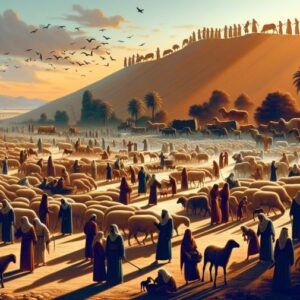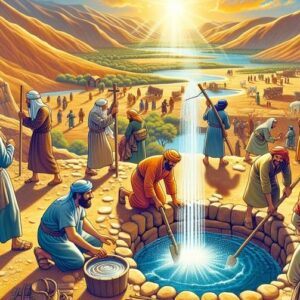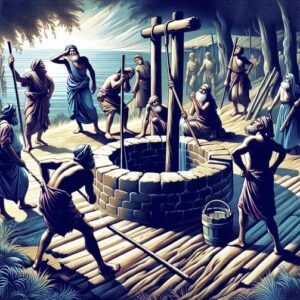ISAAC IN GERAR part-1
During his sojourn in that district he farmed a piece of land, which, by the blessing of God on his skill and industry, was very productive (Isaiah 65:13; Psalm 37:19); and by his plentiful returns he increased so rapidly in wealth and influence that the Philistines, afraid or envious of his prosperity, obliged him to leave the place (Proverbs 27:4; Ecclesiastes 4:4).
This may receive illustration from the fact that many Syrian shepherds at this day settle for a year or two in a place, rent some ground, in the produce of which they trade with the neighboring market, till the owners, through jealousy of their growing substance, refuse to renew their lease and compel them to remove elsewhere.
God blessed Isaac. Be it observed, for the encouragement of poor tenants who occupy other people’s lands, and are honest and industrious, that God blessed him with a great increase.
The Philistines envied Isaac. It is an instance of the vanity of the world; for the more men have of it, the more they are envied, and exposed to censure and injury.
Also of the corruption of nature; for that is an ill principle indeed, which makes men grieve at the good of others. They made Isaac go out of their country.
That wisdom which is from above, will teach us to give up our right, and to draw back from contentions. If we are wrongfully driven from one place, the Lord will make room for us in another.
The Lord then blesses Isaac by giving a hundredfold return on his crops in a season of famine.
In fact, Isaac becomes so rich and powerful that old disputes about water rights crop up. Abimelech sends Isaac away for being “much mightier” than the Philistines (Genesis 26:12–16).
Genesis 26:12-17 KJV
[12] Then Isaac sowed in that land, and received in the same year an hundredfold: and the LORD blessed him.
[13] And the man waxed great, and went forward, and grew until he became very great:
[14] For he had possession of flocks, and possession of herds, and great store of servants: and the Philistines envied him.
[15] For all the wells which his father’s servants had digged in the days of Abraham his father, the Philistines had stopped them, and filled them with earth.
[16] And Abimelech said unto Isaac, Go from us; for thou art much mightier than we.
[17] And Isaac departed thence, and pitched his tent in the valley of Gerar, and dwelt there.
Genesis 26:12 KJV
Then Isaac sowed in that land, and received in the same year an hundredfold: and the LORD blessed him.
 God is with him, you see. That is the blessing that God promised to these people from the day He called Abraham. It was an earthly blessing.
God is with him, you see. That is the blessing that God promised to these people from the day He called Abraham. It was an earthly blessing.
Later on when God put them into that land, He told them He would bless them in their basket; that is, it would be filled with foodstuff.
God made that promise good when they were walking in fellowship with Him. We must remember that He is not promising us that blessing.
He has promised spiritual blessings to us. We are told that we are blessed with all spiritual blessings, and that is our portion today. But that blessing is on the same terms.
It depends on our walk with God. If you will permit Him, He wants to bless you abundantly in your spiritual life. We find here that Isaac is greatly blessed—
While reading this verse, it’s important to remember there was a famine in the land (Genesis 26:1).
The Lord told Isaac not to go to Egypt to escape the famine but to stay in Gerar, the land of the Philistines, instead.
Despite a cowardly lie on Isaac’s part (Genesis 26:7), he has been protected and blessed by God (Genesis 26:11).
Isaac obeyed God’s command to avoid Egypt, staying instead in Gerar, planting crops there. To reap a hundredfold would have been a good return in a normal year.
In a year of famine, and likely and supposed drought, a hundredfold return is simply amazing.
The Lord once again is demonstrating to Isaac and his neighbors that He is with him and providing for him. The following verse will explain the extent to which Isaac is blessed.
This is one of the few times we’re told directly that one of the patriarchs engaged in the planting and harvesting of crops.
Noah was said to have planted a vineyard after the flood, becoming a “man of the soil,” but that account made no mention of further farming (Genesis 9:20).
Genesis 26:13 KJV
And the man waxed great, and went forward, and grew until he became very great:
 Don’t miss the fact that Isaac is greatly blessed. His field brings forth an hundredfold!
Don’t miss the fact that Isaac is greatly blessed. His field brings forth an hundredfold!
The impression some of us have is that Abraham was outstanding, and Jacob was also, but not Isaac. Let me say that Isaac is also outstanding.
It is significant that the life of Isaac is tied in with that of Abraham. Isaac’s birth and his life are interwoven with Abraham’s experiences.
Although Isaac was important when he was offered there upon the altar, again it was Abraham and Isaac together.
Why should it be so presented?
Well, we have already seen that all these things happened unto them for examples to us. It presents a wonderful picture of the intimacy between the Lord Jesus Christ and the Father.
Jesus said, “. . . he that hath seen me hath seen the Father . . .” (John 14:9). And in the high priestly prayer of Jesus, He said, “. . . I have finished the work which thou gavest me to do” (John 17:4).
Also, He said, “. . . My Father worketh hitherto, and I work” (John 5:17).
Therefore, it is very proper that the story of Isaac and the story of Abraham be identified together.
Now here in the chapter before us we see Isaac standing on his own two feet, and he doesn’t look too attractive. He exhibits a weakness and repeats the sin of Abraham.
However, the Word of God makes it clear that Isaac was a very great man in that land—
The prior verse indicated that Isaac has been blessed by God, and this verse gives details on the extent of this success.
Under God’s great blessing, Isaac’s crops yielded a hundredfold return (Genesis 26:12) even in a time of famine (Genesis 26:1).
The result is great and increasing wealth. This is on top of the apparently enormous wealth Isaac had already inherited from Abraham (Genesis 25:5).
In short, Isaac was most likely one of the richest men in the region. Like his father,
God is making it clear to Isaac that he will be blessed for following God’s instructions (Genesis 22:15–18).
The covenant God made with Abraham applies to Isaac, and it applies personally, not merely because Isaac is Abraham’s son (Genesis 26:2–5).
Genesis 26:14 KJV
For he had possession of flocks, and possession of herds, and great store of servants: and the Philistines envied him.
 The Philistines couldn’t stand to see all this prosperity— God has directed Isaac to settle with his wife and his large household in Gerar, a region occupied by the Philistines.
The Philistines couldn’t stand to see all this prosperity— God has directed Isaac to settle with his wife and his large household in Gerar, a region occupied by the Philistines.
This instruction came during a time of famine (Genesis 26:1–3). Once established there, Isaac’s wealth only continued to multiply under God’s blessing (Genesis 26:12–13).
His neighbors would have noticed his growing flocks, herds, and many servants. Anyone who becomes successful will attract attention.
Isaac’s prosperity, however, is happening during a time when many others would be struggling just to survive.
Isaac’s enormous prosperity was apparent to all, and the Philistines didn’t like it. More specifically, they were jealous. They envied Isaac.
As the following verses reveal, they may also have been concerned.
With his outrageous wealth and growing entourage, they will start to fear that Isaac could conceivably take over the kingdom, if he chose to do so (Genesis 26:16).
Genesis 26:15 KJV
For all the wells which his father’s servants had digged in the days of Abraham his father, the Philistines had stopped them, and filled them with earth.
 Abraham had been digging wells in that land, and now his son comes along and the wells become his. But he would go out in the morning and find that the wells were all filled up.
Abraham had been digging wells in that land, and now his son comes along and the wells become his. But he would go out in the morning and find that the wells were all filled up.
This was done by the Philistines and, by the way, this is the first mention of the enmity of the Philistines. This led to continual warfare later on in the days of David.
The previous verse told us the Philistines were envious of Isaac’s enormous and growing wealth.
Despite a famine which would have left most people struggling (Genesis 26:1), Isaac has managed a hundredfold return on his crops (Genesis 26:12–13).
This explosive growth made Isaac and his family a dominant force in their region. This has already generated envy among the Philistines, and will soon result in fear (Genesis 26:16).
As happened with Abraham (Genesis 21:25–26), water rights have now become a point of contention between Isaac and Abimelech’s people.
The famine in the land might have been tied to a drought; this would make arguments over wells even more heated.
Isaac, apparently, had been using wells dug by Abraham’s servants in the days that Abraham lived in Gerar (Genesis 21:30).
Now the Philistines had filled those wells up with dirt, to slow down Isaac’s progress and keep him from using the water.
When something similar happened to Abraham, the prior king had claimed ignorance and, eventually, had made a treaty with Abraham (Genesis 21:31–33).
This time, Abimelech’s response to the dispute over water will be much different.
Genesis 26:16 KJV
And Abimelech said unto Isaac, Go from us; for thou art much mightier than we.
 Notice the importance of Isaac at this time. Conflict had arisen between Isaac and the Philistines in the region of Gerar.
Notice the importance of Isaac at this time. Conflict had arisen between Isaac and the Philistines in the region of Gerar.
For one thing, they were envious of Isaac’s great and growing wealth (Genesis 26:14). Apparently, there were also disputes about water rights.
This combination of envy and desperation led the Philistines to begin filling up Isaac’s wells with dirt to keep him from using them.
Such actions would constitute a direct attack on Isaac’s ability to support his vast herds and flocks. Now the king of the region, Abimelech, steps in to resolve the issue.
He’s not interested in compromise or working out a treaty in this moment. Abimelech simply tells Isaac to leave. Isaac has become too powerful.
The point Abimelech is making here can be taken in one of two ways. On one hand, Isaac’s great estate would require large amounts of land and water.
It’s possible there just wasn’t room in and around the city of Gerar for Isaac’s wealth. Abimelech might simply be saying, “your family is more than the land can support.”
On the other hand, Abimelech might be concerned that Isaac could use his huge number of servants, his money, and the obvious blessing of his God to conquer Abimelech and take over the territory for himself.
We’re never told Isaac had any inclination to do so, but a king like Abimelech must always be guarding his power and authority.
So Isaac will move away, at least from the main part of Gerar’s territory. But he won’t move so far as to violate God’s command (Genesis 26:2–3).
This will result in additional friction with the people. And, as we will see later, it will result in some lingering resentment from Isaac, as well (Genesis 26:26–27).
Genesis 26:17 KJV
And Isaac departed thence, and pitched his tent in the valley of Gerar, and dwelt there.
 This man Abimelech said, “You are causing a great deal of difficulty now, and it would be better if you left.” He had great respect for Isaac, as you can see.
This man Abimelech said, “You are causing a great deal of difficulty now, and it would be better if you left.” He had great respect for Isaac, as you can see.
Now this is a part of Isaac’s life that looks like weakness, but it is not. Notice that he returns back to the land where his father Abraham had been—
During a famine (Genesis 26:1), God had instructed Isaac to stay in the land of Gerar instead of heading into the fertile valleys of Egypt (Genesis 26:2–3).
Though others would have been struggling, Isaac reaps a hundredfold harvest from his planting (Genesis 26:12).
This prosperity boom generates both envy (Genesis 26:14) and fear (Genesis 26:16) in the local people.
As a result, King Abimelech has told Isaac to move somewhere else.
Isaac’s response is interesting, given that God has specifically told him not to leave Gerar to seek better conditions in Egypt.
Rather than leave entirely, Isaac settles his large company in an area known as the Valley of Gerar. This is, it seems, some distance from the main population.
As the next verse will reveal, his first task will be to find water to support his herds and flocks—which will result in continued conflict.

ISAAC IN GERAR part-2
Isaac met with much opposition in digging wells. Two were called Contention and Hatred.
See the nature of worldly things; they make quarrels, and are occasions of strife; and what is often the lot of the most quiet and peaceable; those who avoid striving, yet cannot avoid being striven with.
And what a mercy it is to have plenty of water; to have it without striving for it! The more common this mercy is, the more reason to be thankful for it.
At length Isaac digged a well, for which they strove not. Those that study to be quiet, seldom fail of being so.
When men are false and unkind, still God is faithful and gracious; and his time to show himself so is, when we are most disappointed by men.
The same night that Isaac came weary and uneasy to Beer-sheba, God brought comforts to his soul. Those may remove with comfort who are sure of God’s presence.
Resettled in a different part of Gerar, Isaac continues to have disputes with the locals about the wells he is digging to water his herds and flocks.
Eventually, Isaac travels to Beersheba, given its name in Genesis 21 by Abraham himself.
In Beersheba, the Lord again appears to Isaac, commands him not to be afraid, and renews His promises to be with Isaac and bless him and multiply his offspring for Abraham’s sake (Genesis 26:17–24).
Genesis 26:18-22 KJV
[18] And Isaac digged again the wells of water, which they had digged in the days of Abraham his father; for the Philistines had stopped them after the death of Abraham: and he called their names after the names by which his father had called them.
[19] And Isaac’s servants digged in the valley, and found there a well of springing water.
[20] And the herdmen of Gerar did strive with Isaac’s herdmen, saying, The water is ours: and he called the name of the well Esek; because they strove with him.
[21] And they digged another well, and strove for that also: and he called the name of it Sitnah.
[22] And he removed from thence, and digged another well; and for that they strove not: and he called the name of it Rehoboth; and he said, For now the LORD hath made room for us, and we shall be fruitful in the land.
Genesis 26:18 KJV
And Isaac digged again the wells of water, which they had digged in the days of Abraham his father; for the Philistines had stopped them after the death of Abraham: and he called their names after the names by which his father had called them.
 This reveals the struggle that was carried on. I feel that the water is a picture of the Word of God. We are to drink deeply of it.
This reveals the struggle that was carried on. I feel that the water is a picture of the Word of God. We are to drink deeply of it.
It is called the “water of the Word” and is for drinking purposes to slake our thirst, and it is also for washing. Jesus said that we are cleansed through the Word which He has spoken.
Isaac, though enormously wealthy (Genesis 26:12–13), has a problem. He has been sent away from the area directly around Gerar by King Abimelech.
He has grown too large and powerful to stay without being a threat to the Philistines in the region (Genesis 26:14–16).
Isaac’s choice, shown in this verse, seems to balance the wishes of king Abimelech with his obedience to God.
Earlier, God told Isaac to stay in Gerar rather than seeking better land in Egypt (Genesis 26:2–3).
So, Isaac settles in the Valley of Gerar, which presumably is further from the majority of the people, but still in the same general area.
Isaac must quickly find water to support his herds, flocks, and large company.
What he finds are the old wells that had belonged to Abraham when he lived in this same region (Genesis 21:25–27).
They had been filled in, presumably after Abraham died. Isaac reopens them and begins calling them by the names Abraham had given to them (Genesis 21:23–33).
The fact that these wells were given unique names, and that they were stopped up by the Philistines, indicates just how precious water and water rights were in this arid region of Canaan.
Genesis 26:19 KJV
And Isaac’s servants digged in the valley, and found there a well of springing water.
 Water is a very necessary item in life. You can’t have life without water. You can fly over the deserts of Arizona, New Mexico, and California and see plenty of arid land.
Water is a very necessary item in life. You can’t have life without water. You can fly over the deserts of Arizona, New Mexico, and California and see plenty of arid land.
Then all of a sudden you see an area of lush green and wonder what has happened down there. Water is the only explanation.
Isaac has relocated his large company to the Valley of Gerar, at the request of the local king, Abimelech.
This would have reduced the sense of envy and fear the Philistines had over his great wealth (Genesis 26:14–16).
At the same time, this choice would allow Isaac to honor God’s command to stay in this region instead of going to Egypt (Genesis 26:2–3).
Having moved to a new location, Isaac and his entourage are looking for water.
He has reopened some wells that had been used years before by his father Abraham (Genesis 21:23–33).
This verse begins a sentence describing what happened when Isaac’s servants found a new spring to use as a water source.
The discovery led to immediate conflict—the local people are not satisfied with where Isaac’s people are seeking water (Genesis 26:20).
Genesis 26:20 KJV
And the herdmen of Gerar did strive with Isaac’s herdmen, saying, The water is ours: and he called the name of the well Esek; because they strove with him.
 And, my friend, water is the explanation for the differences between God’s children in any church—the water of the Word of God.
And, my friend, water is the explanation for the differences between God’s children in any church—the water of the Word of God.
There is a great difference in the lives of believers who study God’s Word. And there will be a struggle.
I think that you will always have to pay a price if you are really going to study the Word of God. The devil will permit you to do anything except get into the Word of God.
God had commanded Isaac to stay in Gerar (Genesis 26:2–3), but the local king is bothered by Isaac’s great wealth and prosperity (Genesis 26:14–16).
To satisfy both sides, Isaac and his large estate are newly encamped in the Valley of Gerar (Genesis 26:17). If they’re going to stay, it’s essential they find plentiful water.
The previous verse describes the discovery of a spring by Isaac’s servants. Now we learn that the local herdsman claimed the rights to that water.
The conflict is similar to the plot of many old western movies, in which ranchers would battle over rights to the water from the local river to grow crops or maintain sheep and cattle.
Isaac, however, seems unwilling to battle over anything. His reputation as a passive man comes, in part, from his seeming refusal to fight or even challenge those who stand up to him.
Instead of using his considerable power to keep the well, Isaac bows out. He names this well Esek, which means “quarrel” or “contention,” and moves on to another one.
Genesis 26:21 KJV
And they digged another well, and strove for that also: and he called the name of it Sitnah.
 Isaac has moved his large entourage away from the main population of Philistines in order to assuage their concerns (Genesis 26:14–16).
Isaac has moved his large entourage away from the main population of Philistines in order to assuage their concerns (Genesis 26:14–16).
Having moved to a new location (Genesis 26:17), Isaac and his people try to establish a reliable source of water (Genesis 26:18).
That resulted in an immediate conflict (Genesis 26:19–20). Isaac, following his reputation for being passive, chooses not to fight for this resource and instead moves on.
Isaac called that first well Esek, which means “quarrel” or “contention.”
Unfortunately, for a second time, Isaac’s servants dig a new well and are once again challenged by the local herdsmen over the water rights.
He names this one Sitnah, which means “enmity.” We’re not told that Isaac went to battle over these wells, simply that he named them to represent the dispute they caused.
Given the fear expressed by the local king (Genesis 26:14–16), it seems that if Isaac had chosen to fight for these resources, he probably could have kept them.
Genesis 26:22 KJV
And he removed from thence, and digged another well; and for that they strove not: and he called the name of it Rehoboth; and he said, For now the LORD hath made room for us, and we shall be fruitful in the land.
 Then he calls the well Rehoboth. It means “there is room for us” Before that he would dig a well and they would take it away from him.
Then he calls the well Rehoboth. It means “there is room for us” Before that he would dig a well and they would take it away from him.
He’d move up, dig another one, and they would take that away from him. He would just keep moving up.
This certainly reveals that Isaac is a man of peace and a man of patience. David wouldn’t have done this, I can tell you that.
Simon Peter wouldn’t have done that. It is a real lesson for us here. This is especially applicable when we apply it to the study of the Word of God.
Having moved some distance away from the main population of Gerar (Genesis 26:14–17), Isaac’s men have dug two wells so far.
In both cases, they were challenged by the local herdsmen over the rights to the water.
Isaac named both wells to represent the disputes that came from them (Genesis 26:18–21).
The first was called Esek, the second Sitnah, meaning “contention” and “quarrel,” respectively.
This choice seems to reflect a passive attitude on the part of Isaac, since he’s clearly powerful enough to keep those wells by force, if he so chose.
The third well, however, brings no dispute from the locals. Perhaps they gave up challenging Isaac once they realized he would just keep digging wells.
Or, perhaps Isaac’s family has moved far enough away that it’s just not worth a challenge from the locals anymore, we don’t know, but Isaac appears to be satisfied.
He names this well Rehoboth, which means “broad places” or “room,” and he gives credit to the Lord for providing it.
Specifically, Isaac notices that the Lord has made room for his enormous estate to settle in the region.
Nothing would now stand in the way of the fruitful growth of all of his possessions.
I hope that you have really enjoyed this post,
Please Leave All Comments in the Comment Box Below ↓













Hi there
The article “Isaac in Gerar: Isaac is Abundantly Blessed” beautifully highlights the importance of trusting in God’s provision, even in challenging circumstances. It demonstrates how Isaac’s unwavering faith led to abundant blessings, showing that God’s promises remain true when we rely on Him. The scriptural references enrich the narrative, offering both inspiration and reflection for daily life.
How can we cultivate the same level of faith in modern times, especially when faced with uncertainty?
Hi Troy!
I’m glad you found the article meaningful.
Cultivating faith in modern times, especially amidst uncertainty, can indeed be challenging. One approach is to regularly remind ourselves of past experiences where faith and trust have been rewarded, much like Isaac’s story.
Engaging in daily spiritual practices, such as prayer, meditation, or reading inspirational texts, can help maintain a focus on God’s promises. Surrounding ourselves with a supportive community can also provide encouragement and shared wisdom. Ultimately, it’s about creating a personal relationship with faith that helps anchor us during uncertain times.
How do you personally stay grounded in your faith when things get tough?
Hope this helps,
Blessings My Friend!
This passage beautifully illustrates God’s provision and the human response of jealousy and conflict.
Isaac’s obedience to God, even during a famine, led to an extraordinary blessing—a hundredfold return on his crops. His growing wealth and influence, however, caused envy among the Philistines, reminding us of the sad reality that success often breeds resentment.
The story serves as an example of God’s faithfulness and favor towards those who follow His will, even in challenging times. Isaac’s journey teaches us that material blessings may come, but they also bring their own challenges, including envy and opposition from others. Yet, Isaac responded with wisdom and humility, moving when confronted, and trusting God to provide a place where he could prosper without contention.
In a spiritual sense, the wells can symbolize the Word of God, and just as Isaac had to re-dig the wells his father had once used, we, too, must return to foundational truths in times of struggle, seeking refreshment from God’s wisdom.
Hello John,
That’s a profound reflection!
I love how you highlighted the dual nature of blessings—while they can lead to growth and abundance, they can also stir conflict and jealousy. Isaac’s journey really exemplifies the importance of humility and discernment in the face of opposition.
Your analogy of the wells as foundational truths is especially powerful; it reminds us that in our own lives, we need to continually seek out and restore those spiritual wells for nourishment and strength. It’s a beautiful call to remember where our true source of provision lies, even when challenges arise!
Blessings My Friend!
What an insightful article on Isaac’s journey in Genesis 26!
I really appreciate how it highlights Isaac’s patience and faith amidst the envy and opposition he faced from the Philistines. It’s fascinating to see how he continually chose peace over conflict, even when he had the power to assert himself over the wells.
Naming the wells Esek, Sitnah, and Rehoboth symbolized the struggles and eventual relief he experienced, which I think reflects the challenges we often face before finding our own “room” or peace.
The connection made between Isaac’s experiences and our spiritual walk today is thought-provoking, especially the idea that God’s blessings come as we walk faithfully with Him.
This piece definitely offers a fresh perspective on trusting in God’s provision and timing, even when circumstances seem challenging.
Hello Kavitha,
Thank you for your thoughtful comment!
I’m glad you found the article insightful. Isaac’s journey really does serve as a powerful reminder of the importance of patience and faith in our own lives. The way he navigated conflict and chose peace resonates deeply, especially in today’s world. It’s inspiring to see how his experiences mirror our spiritual journeys, highlighting that even in struggles, we can find blessings through faith.
I appreciate your reflections on the symbolism of the wells—it really captures the essence of finding our own space of peace amidst challenges!
Blessings My Friend!
This piece about Isaac’s time in Gerar really highlights how faith, success, and human relationships can play out in tough situations.
Isaac’s journey is relatable for anyone who has dealt with jealousy or challenges in their own life. His ability to succeed even during a famine shows just how much God provides and blesses us.
When Isaac chose to reopen the wells that had been filled in, it symbolizes a deep lesson about resilience and restoration. The names he gave the wells—Esek and Sitnah—remind us of the struggles he faced, but his eventual discovery of Rehoboth, a well free of conflict, emphasizes the rewards that come from patience and loyalty.
This story encourages us to think about our own challenges and the significance of trusting in God’s timing and support. In a world filled with rivalry and envy, it’s uplifting to realize that through perseverance, God can lead us to places of abundance and tranquility.
Engaging Question: Reflecting on Isaac’s journey in Gerar, how can we better handle feelings of envy or conflict in our lives?
What lessons can we take from this story about achieving peace in tough times, and how might we use these insights in our relationships today?
Hello charzaria,
What a thoughtful reflection!
Isaac’s journey is indeed a powerful reminder of resilience and the importance of maintaining faith amidst challenges.
To handle feelings of envy or conflict, we can start by practicing empathy and understanding—recognizing that everyone faces their own struggles. Just as Isaac chose to reopen the wells and eventually found a space of peace, we can look for ways to foster open communication and collaboration in our relationships.
In tough times, it’s crucial to focus on the blessings we have rather than what we lack. By celebrating others’ successes and practicing gratitude, we create a more positive environment that can help us all thrive.
What specific strategies do you think we could implement to support one another in this journey?
Blessings My Friend!